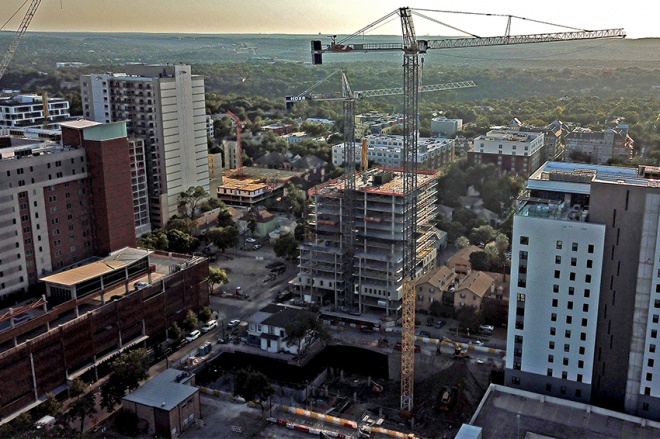Student Government calls to expand West Campus’ affordable housing plan
December 17, 2021
Editor’s Note: This article first appeared in the October 22 flipbook.
UT Student Government is pushing Austin City Council to lower the median family income required for students to receive affordable housing in West Campus amid a rising cost of living in the city.
SG approved legislation last week to make S.M.A.R.T housing more accessible to students and sent the legislation to Austin’s City Council, but SG did not include a target income number to access S.M.A.R.T housing. The proposed legislation also calls to update the city’s Land Development Code so the construction of student S.M.A.R.T housing can expand outside of West Campus.
“(S.M.A.R.T housing is) tied to median family income and … vastly overstates what the income of students actually is and what they can afford,” said Rylan Maksoud, Student Government’s housing policy director. “We’re calling on City Council to lower the percentage of median family income that the rent limits are tied to to reduce the rent for students in S.M.A.R.T housing.”
S.M.A.R.T housing is an Austin plan designed to create housing that is accessible to everyone by requiring developers to set aside at least 10% of housing units for low-income residents. To qualify for the housing currently, a student’s median family income must be 60% or less than $81,000.
The West Campus area also has an individual housing plan called the University Neighborhood Overlay. The plan requires 10% of housing to be reserved for people making under 50% of the median family income in Austin, while another 10% is reserved for people making under 60% of the median family income.
Nathan Jones, an Austin Housing and Planning Committee spokesperson, said the city updates what income level Austinites need to meet for affordable housing based on the population every year. However, SG said students who are paying for their own housing do not make the same amount of money as Austin adults.
The housing plan organizes West Campus’ affordable student housing because of the way the neighborhood is zoned, according to the resolution. Areas on the outskirts of West Campus do not have affordable housing models, so the area is running out of space to build more affordable units, the resolution said.
“Austin is currently in the midst of a housing affordability crisis, pricing out students, professors, and valuable university community members,” the resolution said.
Jones redirected comments on the limited space available for the housing plan. The city did not immediately respond to The Daily Texan request for comment.
While SG passed the legislation, no actual changes to the affordable housing plan can be made without the approval of City Council. The process would require multiple steps by the city to update the plan, including a change of code, a rezoning application and a resolution by the council, Jones said.
“(Student Government) would have to go to the planning commission for a recommendation and then finally the City Council for approval,” Jones said. “City Council makes these changes, but the actual steps by which that happens is just like everything in government — there are procedures.”
Graduate student James Wilson currently lives in S.M.A.R.T housing in East Austin. Wilson said that while the housing is obtainable for graduate students, some undergraduates may have issues obtaining affordable housing if their parents are co-signers.
“You have to have a minimum income, and then there is a maximum income cut-off, but for a lot of students, they’re not making that much in a year to meet those standards, and if you have a parent that makes more than that (and) is a co-signer, you can’t qualify,” Wilson said. “So there are some intentional barriers to prevent undergrads from getting access to these units.”
Graduate student Cecilia Fitzgerald said she applied for S.M.A.R.T housing over the summer, but had some issues with the application process. Fitzgerald said she was not approved until the day before she needed to move in, but by then, she had already moved into another place.
“It would be great if (the city) re-evaluated their income criteria, especially for undergraduate students that aren’t necessarily making income,” Fitzgerald said.











